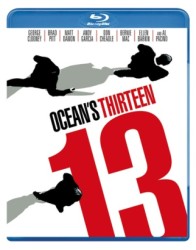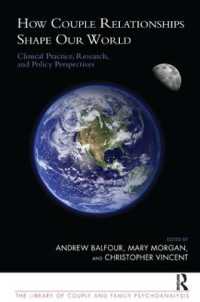- ホーム
- > 洋書
- > 英文書
- > Business / Economics
Full Description
Elephant tourism is a growing activity in many countries across Asia and Africa and is popular with tourists from all parts of the world. Elephant tourism has grown rapidly, providing the only viable way for elephants and their owners to survive since the banning of logging. Old logging camps have been developed into sanctuaries for some elephants, but many other camps were established as entertainment centres, resulting in serious welfare issues for the elephants and their mahouts. The profits from elephant tourism in Asia have encouraged African operators to follow a similar business model. This book draws attention to the need for a comprehensive and rigorous focus on local solutions to improve the welfare of captive elephants, their mahouts and local residents, and to enhance tourists' experiences of elephant tourism. It achieves this by: - Critically reviewing recent research into elephant tourism. - Providing contemporary analytical case studies of elephant tourism policy and practice. The Elephant Tourism Business will contribute to a better understanding of how elephant tourism is organised, regulated and promoted, both in elephant areas and tourist origin countries. It identifies priorities for future research into elephant tourism and provides a unique, authoritative resource for researchers, elephant managers and administrators, and tourism managers. The book will be of interest to academics and practitioners with backgrounds in conservation, the environment, tourism and veterinary sciences, and will appeal to tourists keen to experience elephants in person.
Contents
1: Personal Experiences of Elephant Tourism 1: Managing the Anantara Golden Triangle Elephant Camp. Eric Laws Interviews John Edward Roberts 2: PATA and Jetwing. John Koldowski Interviews Chi Lo and Senal Siriwardene 3: The Elephant in the Room: an Auto Ethnographic Approach. Vinathe Sharma Brymer and Eric Brymer. 2: Expectations and Experiences of Interactions with Elephants 4: Drivers of Elephant Tourism in Thailand. Bongkosh Rittichainuwat, Noel Scott and Eric Laws. 5: Visitor Expectations and Behaviours at Elephant Camps. Saranphat Chotmanakul and Somyot Onghlualp 6: Alternative Forms of Elephant Tourism. Susanna Curtin and Charlotte Day 7: Elephant Visitor Preferences and Experiences in Sri Lanka. Ramona Strödecke and Nicole Häusler. 3: Ethical and Moral Perspectives 8: Moral Tensions for Elephant Visitors. Anja Pabel and Mucha Mkono 9: The Valuation of Ethical Encounters with Elephants. Quingmong Cui and Honggang Xu 10: Community, Collaboration, Elephant Conservation and Protection. Liv Baker, Sarah Blaine and Rebecca Winkler 11: Conservation-based Elephant Tourism: an Importance-Performance Analysis. Daminda Sumanpala, Nilakshi Galahtiyawe and Isabelle Wolf. 4: Frameworks for Modern Elephant Tourism Management 12: The Effectiveness of Elephant Welfare Regulations in India. Sumanth Bindumadhav, Alakparna Sengupta and Shilapa Mahbubani. 13: Elephant Tourism Conservation and the Need for a New Strategy: Thai Stakeholder Attitudes. Ann Suwaree Ashton. 14: Elephant Tourism, the ABTA Animal Welfare Guidelines. Claire Jenkinson 5: Elephants and Their Stories 15: A Case Study of Elephant Venue Narratives. Jeffrey Dale Hobbs and Pienpeng Na Pattalung 16: The Valuation of Elephant Sightings in Protected Areas. Andrea and Melville Saayman 17: Social Media: a Proxy Voice of Elephants. Kannapa Pongponrat and Naphawan Chantradoan 6: What Next? Proxy Voices for Elephants 18: Modernising Human-Elephant Interactions. Andrew McLean 19: Validating a Captive Elephant Welfare Index. Vivek Gurswamy and Clive Phillips 20: Promoting Elephant Friendly Tourism. Marjorie Van Strien and Jan Schmidt-Burback 21: The Paradox of Elephant Friendly Tourism. Daniel Turner and Naut Kusters 22: Conclusion. Xavier Font, Noel Scott, John Koldowski and Eric Laws. 23: Postscript. COVID-19 and The Elephant Tourism Business, a Preliminary Analysis. Eric Laws, John Koldowski, Xavier Font, Noel Scott, Taweepoke Angkawanish, Nina Brask , Daniel Turner, Bongkosh Rittichainuwat and Suphaporn Rattanaphinanchai








